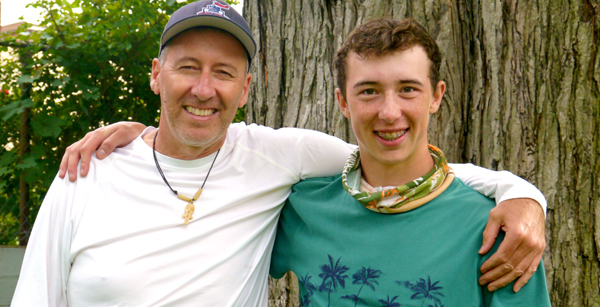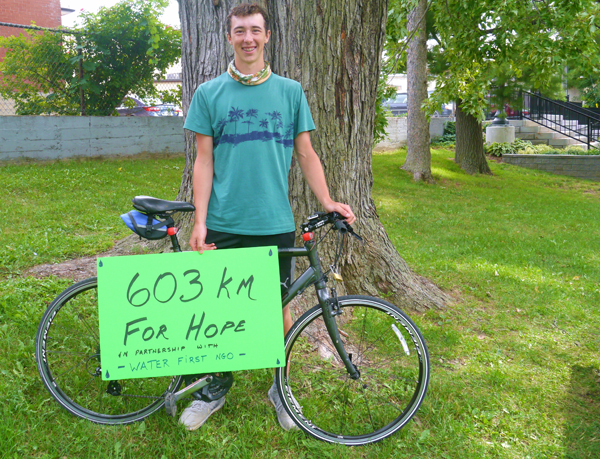Teenager tackles 603km trek to help get water to Indigenous communities
Administrator | Aug 30, 2020 | Comments 0

John and Zack Stabb
Story and photos by Sharon Harrison
A tired teenager and his trusted bicycle parked for a short break in Picton’s Benson Park – at about the mid-way point of a 603km journey from Montreal to Toronto.
The 16-year-old spent his summer vacation planning the six-day fundraising excursion as part of a mandatory school positive impact project that he hopes in the end, will help raise the quality of the water in Indigenous communities.
Zach Stabb embarked upon the six-day ride last Sunday from Saint Joseph’s Oratory of Mount Royal in Montréal, and, all being well, will complete his mission this weekend at Toronto’s CN Tower.
A student at Howard S. Billings Regional High School in Châteauguay, Quebec, Zach, along with all the students in the same year, was tasked with taking on an individual senior year project, required for students between Grades 10 and 11.
“They have only one guideline: to make a positive impact in one way or another,” says Zach. “They tell us you have to do something you won’t loathe doing… If you are not excited to do any part of this project, from writing the report to actually producing the actual project, it’s not worth it because you are going to struggle.”
Zach says some of his friends are doing documentaries and videos, one is building a robot, another is writing a novel.”
He choose to cycle from Montréal to Toronto over six days, averaging roughly 100 kilometres a day, and is “super excited” about achieving a cycling feat and specifically addressing Indigenous water issues.
During his research, he discovered a non-profit organization called Water First, based in Creemore, Ontario which goes into remote communities to train Indigenous young adults to operate water systems and to monitor the quality of the water.
He says 20 per cent of all First Nations Canadian communities, and up to 40 per cent of communities in Ontario, don’t have access to safe water, and are often subject to boil water advisories.
“It was a shock to me that in a first world country like Canada with six per cent of the world’s fresh water, that some of our citizens have to live their daily lives without this essential resource.”
“I didn’t know much about it, but I knew it was a very complex issue because it was something that didn’t have one specific trigger in the way it was caused, but it was a lot of different things and that was the reason that it has existed for so long,” explains Zach.
“You can’t give your kid a bath, you can’t take showers, kids have skin disorders when they grow up because they consume the contaminated water, it’s awful,” he says. “It’s an infinite cycle too and it never stops.”
“Researching more, I found out that there are many factors, but a lot of them are more minor than people think. Sometimes people are saying it is the old infrastructure and that’s what’s holding them back, but it is the lack of people to actually operate them.”
Zach says some of these Indigenous communities – whether a few hundred people or a 1,000 – in northern Ontario and Alberta are very remote places and are only accessible by air.
“It’s a very hard commitment for someone with the right skills to fly up there and operate a water system,” he says.
Water First is working with and training Indigenous young adults to help raise the quality of the water in their communities. Zach’s fundraising campaign will go directly to helping these important training programs continue. His fundraising goal of $1,500 is already approaching $6,000.
Water First trains 10-12 Indigenous young adults each year. The program takes eight months to complete, where individuals receive qualifications in two fields – environmental water quality and monitoring, and maintaining and operating the water plants.
“Within eight weeks, usually about 90 per cent of the people that graduate from the class are already pursuing further study or are already employed in the field,” says Zach.
Dad John Stabb says Water First is pragmatic in its approach which is about teaching the communities to help themselves.
“They make a big issue out of integrating with the cultures, but making sure it’s not white man coming and telling them how to do this stuff. It’s being respectful of how they learn, how their culture approaches the different resources; I really like their approach overall.”
Zach said his big school project will last almost year. His teachers vet the students’ ideas to ensure they are challenging.
“I wanted to do something that was quite Canadian, something that Canadians could identify with and I wanted to go from a monument to a monument, in a decent amount of distance,” says Zach.
“That’s when I started biking a little bit,” he says. “I started researching and I found out how much of a problem the water was. I wanted to be a juncture in the point where this would be something that would be talked about for a long time. I think awareness is everything.”
 He decided to go to Toronto’s CN Tower, a 603km journey monument to monument from Saint Joseph’s Oratory of Mount Royal.
He decided to go to Toronto’s CN Tower, a 603km journey monument to monument from Saint Joseph’s Oratory of Mount Royal.
Hi dad John, is nearby following in his van, or often times, half an hour ahead of his son, but they stay in communication, although they have lost each other briefly a few times. Dad is there just in case Zach runs into trouble, and he has supplies of snacks and water to keep his son fuelled.
“It’s been fine for me as I’m an adventurer in spirit, so I’ve enjoyed it,” says John. “His mum is a little bit more cautious and more risk averse, so it’s a little bit tougher on her. When Zach first announced what he wanted to do, I was a little bit excited and Isabelle was a little more skeptical. Nonetheless, I thought there were a lot of logistics involved, so I thought he was not thinking it through and it would eventually dissipate, and it didn’t dissipate.”
They travelled through towns such as Cornwall, Brockville, Gananoque, the Thousand Islands, Kingston, Adolphustown, and this week, Prince Edward County.
“The route that he took was the old 401, so when I was a kid we used to take the old Highway 2, so it was kind of nostalgic for me,” says John. “The old trail goes all the way from Lancaster, which is past Cornwall, all the way to Toronto; we could follow the same signs the whole time and it has been very simple.”
For Zach, he has been taken in by the beauty of the countryside as he travels from place-to-place, comparing the differences in architecture to Montréal.
“There is farmland, little farming communities; I go along the water and smaller towns most of the time. It’s been beautiful and I love the feel of the old towns, the beautiful streets, all the buildings look like they are from the 19th century.”
Originally planned for mid-July, the ride had to be put off several times when other things came up, including poor weather. The trip rescheduled for late-August was the last opportunity it could happen before Zach’s return to school next week.
He has dodged a few thunderstorms and a little rain, but hasn’t encountered anything he couldn’t handle.
At about the halfway point of his trip, Zach considers his day in the County as the last big day of cycling. He front-loaded his trip, putting in longer days at the beginning when he expected to have more energy and planned shorter rides for the remainder of the journey.
He said his bike has been reliable (although he has a spare just in case), the weather has been good, and he admits to sleeping solidly every single night.
“I was building up myself, my endurance, my confidence and all that,” he said. “It’s been more of mental battle than anything. The wind is always blowing in my face. It’s kind of lonely sometimes too as I’m all by myself. And it is beautiful scenery. It’s unbelievable here and it takes my mind off cycling sometimes just looking around and seeing this beauty.”
Lessons were learned on the first day, which Zach describes as “brutal” because he hadn’t eaten enough to get him through the 130-kilometre stretch from Montreal to Cornwall.
“The last 25 kilometres were very tough, but it was really humbling because I had completely overestimated what my body would be able to handle. The pedals were rocks sometimes and my mind was starting to wander too much and I was just getting lost in all that; my morale was going down and down.”
He is buoyed by support from Water First.
“I originally emailed them to get some support early on in the project and they were extremely helpful and they gave me a lot of good guidance and helped me start the fundraiser.”
While he says Water First has indicated the last two governments have helped reduce the water crisis problem by a third, there is still much work to be done.
“The Trudeau government have made a pledge to end it by, I believe 2021 or 2022, but so far there haven’t been many strides that have proved that it’s ever going to happen,” says Zach. “I think it’s a big ambitious number in that short time span. It’s a big issue that has existed since the 1990s and hasn’t found any resolve yet.”
He hopes the problem can be fixed with enough time, enough funds, and awareness from people at the top.
“I want as many people to know about this as I can. It’s about awareness.
“I think that’s also the thing I want to do with this project, you have got to put pressure on people in power. Show by being a younger person in Canada, show we are aware of these things going on and that we want to make a difference just as much older people do. It will get resolved and I want to be a step in that process, and I just want to play my part in eradicating this issue.”
“These people have lived for years without water,” notes Zach, hoping that others will take time to consider what they would do without water.
“It’s something people take for granted in most places and it is something these people have lived with for years. It’s something we need to use every day from showering to cleaning dishes to drinking; it’s stuff that changes lives,” states Zach.
“I think the government has to do its part in protecting every single person in Canada because everyone deserves to be treated the same way. They should be taking a long hard look at this and getting the willpower to do something about it because they are the ones with the power. There is only so much we can do as people in the end and it’s the government that’s really going to make the changes.”
Zach is also thankful his dad is his partner for the journey.
“It’s a big workload and my dad is just as much a big part of this project as I am. It’s a big commitment and he has everything in the car we need. He goes out sometimes at night when I’m hungry and I can’t move because of my legs. I am very thankful.”
Every cent donated to Zach Stabb’s fundraising campaign will go to Water First’s internship program. Click here for the Canada Helps link to make a donation
Filed Under: cheers • Featured Articles • Sports & Recreation
About the Author:
































